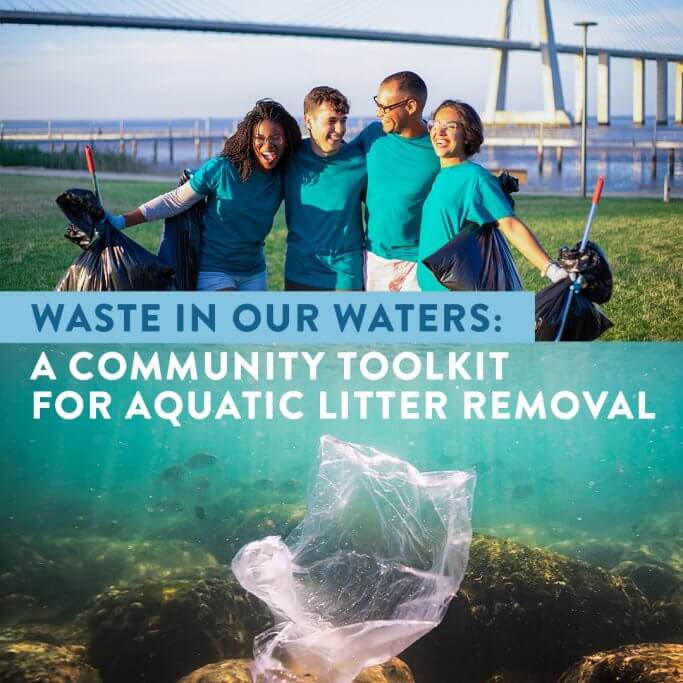Waste in Our Waters: A Community Toolkit for Aquatic Litter Removal
Waste in Our Waters: A Community Toolkit for Aquatic Litter Removal is a step-by-step guide for addressing litter in your community, both before and after it reaches your local waterway.
River Network is proud to provide this free to access, easy to understand toolkit, thanks to the generous support of The Coca-Cola Foundation. Within, you’ll find a variety of strategies, activities, and specific devices to help address aquatic litter in your community. Whether you’re a community organization, concerned citizen, or local decision-maker, Waste in Our Waters will walk you through assessing your community’s aquatic litter issues, planning a cleanup effort, choosing a litter capture device, responsibly disposing of the waste you collect, and more. And, the strategies, activities, and devices included can be applied across the country.
At The Coca-Cola Company, we care about our oceans and waterways … Through these litter catchment systems, we hope to not only reduce pollution in our local waterways but also demonstrate the benefits that recycling brings to a local community.”
Jon Radtke, Director of Water Sustainability, Coca-Cola North America
Why River Network Created Waste in Our Waters
Experts of all stripes, from marine scientists to civil engineers, see a need for immediate actions to curb the deluge of garbage pouring into our oceans. Marine litter not only harms our ocean ecosystems, but is dangerous for freshwater systems as well as trash pollution migrates downstream from rivers, streams, and estuaries. Litter impacts our communities in many ways, with environmental, social, and economic costs.
As outlined in our Strategic Plan, we are committed to providing knowledge, tools, and engagement opportunities to local champions building resilient communities that anticipate risk, limit impact, and recover quickly from disaster. This toolkit empowers local communities to build a plan that works for them, taking into account their own unique challenges, and connecting them to others to share knowledge that might apply in other communities.
Waste in Our Waters accomplishes this in a number of ways by providing:
- Understanding of the prevailing attitudes toward litter in 12 urban centers across the US, as well as the strategies for addressing litter that garner the greatest support.
- An in-depth look at in-stream litter capture devices available to groups, along with an easy to read table to help you determine which device will work best in your community and waterway, given your unique stream velocities, potential trash loads, budget requirements, and maintenance abilities.
- Additional information on how to prevent litter from entering your waters in the first place, litter regulation, the impacts of litter on our communities, how to assess your litter to inform your cleanup strategy, what to do with the litter you collect, and more.
Working partnerships are vital when it comes to addressing litter issues. Throughout Central Alabama, local governments, nonprofits, schools and universities, and businesses have joined forces to fight against litter and to promote clean water and healthy communities. Working together means we can make a large-scale impact, greater than what any of us could do alone.”
Sally Larue, Outreach Coordinator, Freshwater Land Trust
Participant of River Network’s Litter Device Pilot Project
Get Support for Local Litter Management
Are you working to manage litter in your community? Would you like to connect with others in our network who are? Contact Grace Fullmer, Corporate Partnerships Manager, at gfullmer@rivernetwork.org.
Sign up for our newsletter today to stay informed about how local groups are finding new and innovative ways to restore and protect their waters and opportunities to receive training and support.





